Below you can find some of the postcards created as part of an experimental writing exercise described here.
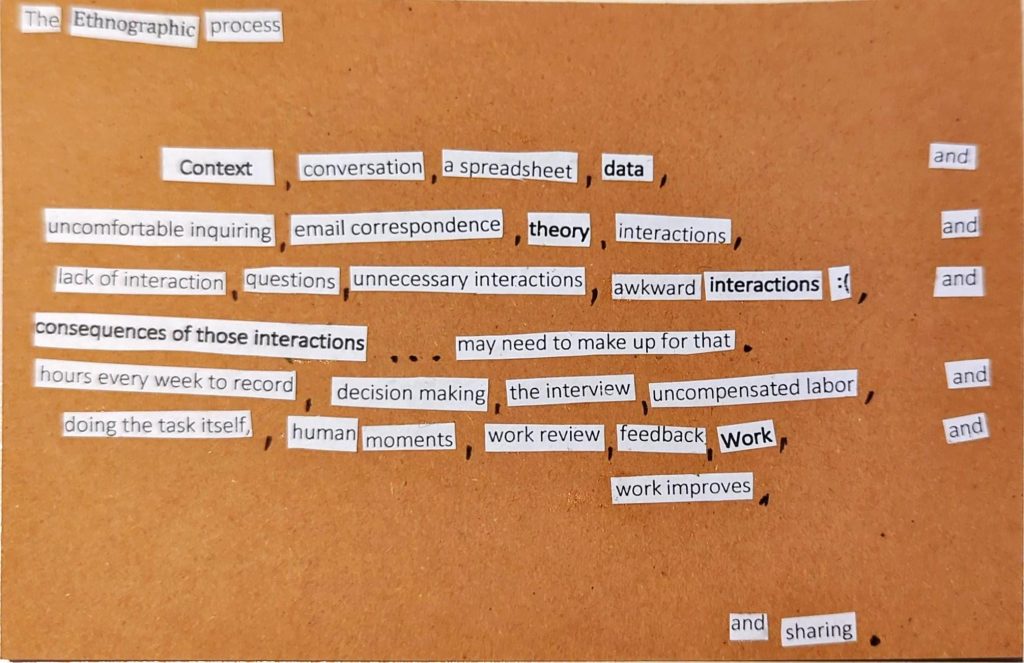
The front of the postcard by a student in an urban ethnographic field school. A collage-style poem titled “The Ethnographic Process.” The poem is composed of various words and phrases cut out from a handout on qualitative coding, distributed in a previous class meeting, arranged in a scattered format.

The back of the same postcard addressed to The Ethnographic Prcess: “I hope you like the poem I made for you.”
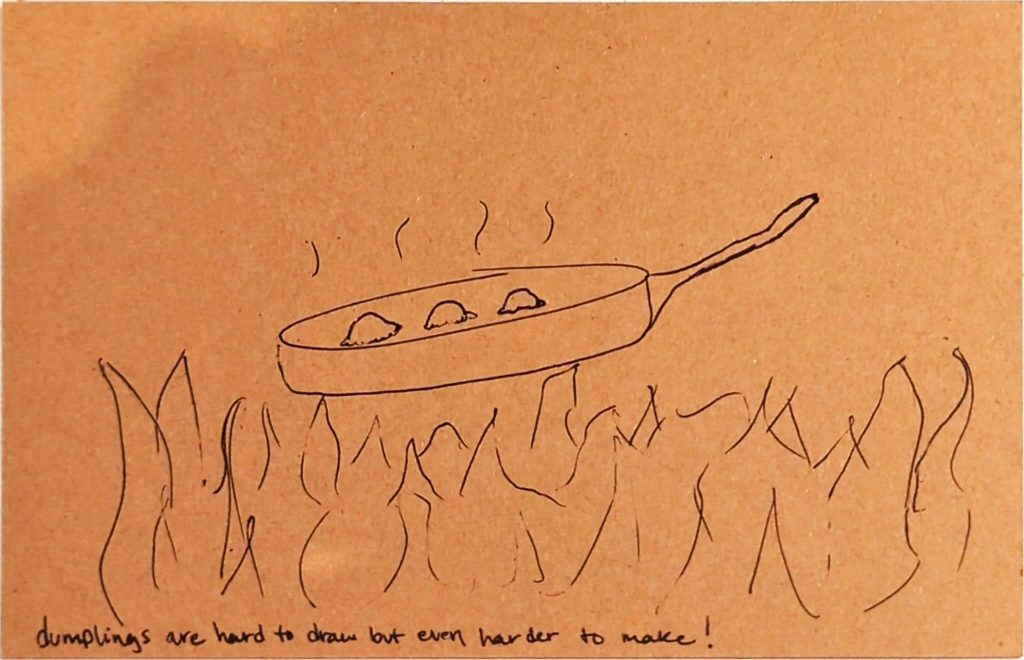
A simple line drawing on the front of a postcard by a student researcher/ethnographer. The drawing depicts a frying pan with three dumplings inside, placed over an open flame.
![A handwritten message on the back of a brown postcard. The text reads:"Hi Amir, I have to tell you about something I saw the other day. There was this woman who moved here from Mongolia and, through myriad life circumstances, ended up teaching me her family dumpling recipe. Despite significant language, cultural, and generational barriers, we were able to (along with 5-6 others) assume a responsibility and execute a task. Here's what I learned: dumplings are incredibly labour-intensive. I am also not sure if this recipe is 'authentically' Mongolian but I know that doesn't matter. It will never cease to amaze me how the most mundane facets of human life (i.e. food) have the capacity to bridge differences and transcend cultural divides. I am not always consciously aware of it, but this is a small part of what draws me to the social sciences. Ok, I'm out of room. Bye for now :) TO: Amir Shiva ANSO205 Vancouver, BC FROM: [Sender's address obscured].](http://blogs.ubc.ca/multimodalethnography/files/2024/06/dumplings-back-1024x660.png)
Message on the back of the same postcard:
Hi Amir,
I have to tell you about something I saw the other day. There was this woman who moved here from Mongolia and, through myriad life circumstances, ended up teaching me her family dumpling recipe. Despite significant language, cultural, and generational barriers, we were able to (along with 5-6 others) assume a responsibility and execute a task. Here’s what I learned: dumplings are incredibly labour-intensive. I am also not sure if this recipe is ‘authentically’ Mongolian but I know that doesn’t matter. It will never cease to amaze me how the most mundane facets of human life (i.e. food) have the capacity to bridge differences and transcend cultural divides. I am not always consciously aware of it, but this is a small part of what draws me to the social sciences. Ok, I’m out of room. Bye for now 🙂
TO: Amir Shiva
ANSO205
Vancouver, BC
FROM: [Sender’s name obscured].

Front of a post card by a student in an urban ethnographic field school. A hand-drawn sketch depicting a street scene.

The back of the same postcard. The message reads:
“Dear Tote Bag Lady,
You were the first person I encountered on my weekly walks down the DTES. Steps away from the UBC Learning Exchange, you looked like the embodiment of joy, dressed in bright pink and dancing with every person who walked past while you promoted your hand-made tote bags. You invited me to visit you at the upcoming ‘Car free day,’ like one would invite an old friend to a backyard barbecue. Within seconds, you engulfed me with happiness and a sense of belonging. Whether you intended to or not, you helped me transition my mindset from an outside researcher to an embedded aspect of the community. I hope I’ll see you again soon on my community walks.
Love,
Emma.”
On the right side, there is an address field with “TO” and the recipient’s address:
“Tote Bag Lady
548 Main Street, Vancouver
BC, V6A 2T9
Canada
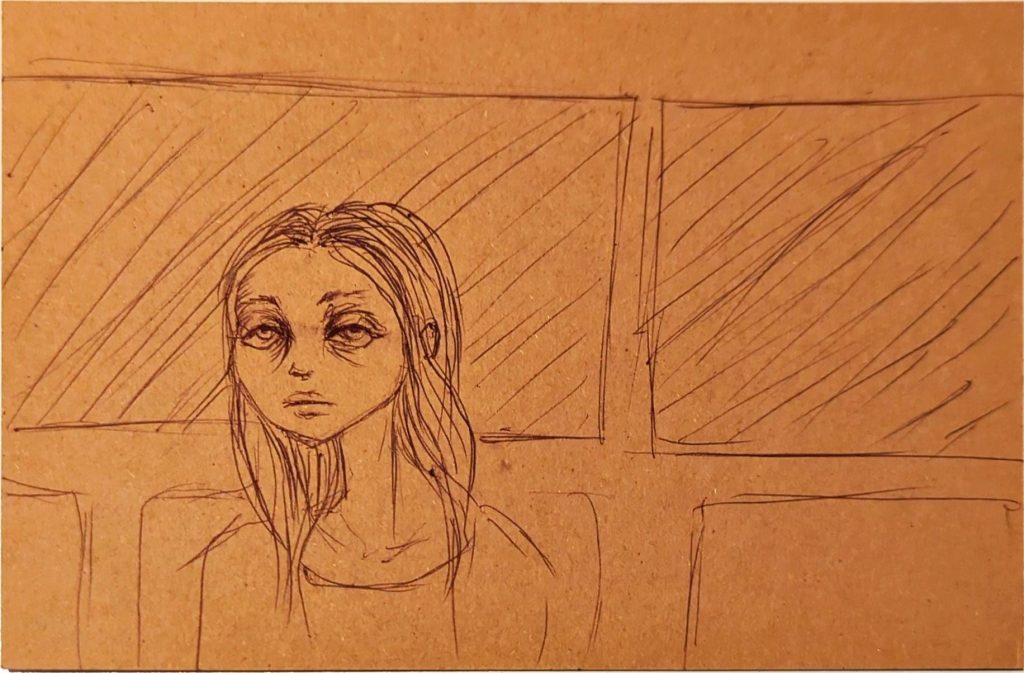
A hand-drawn sketch depicting a young woman with long hair sitting inside a bus.From a postcard created by a student in an urban ethnographic field school.
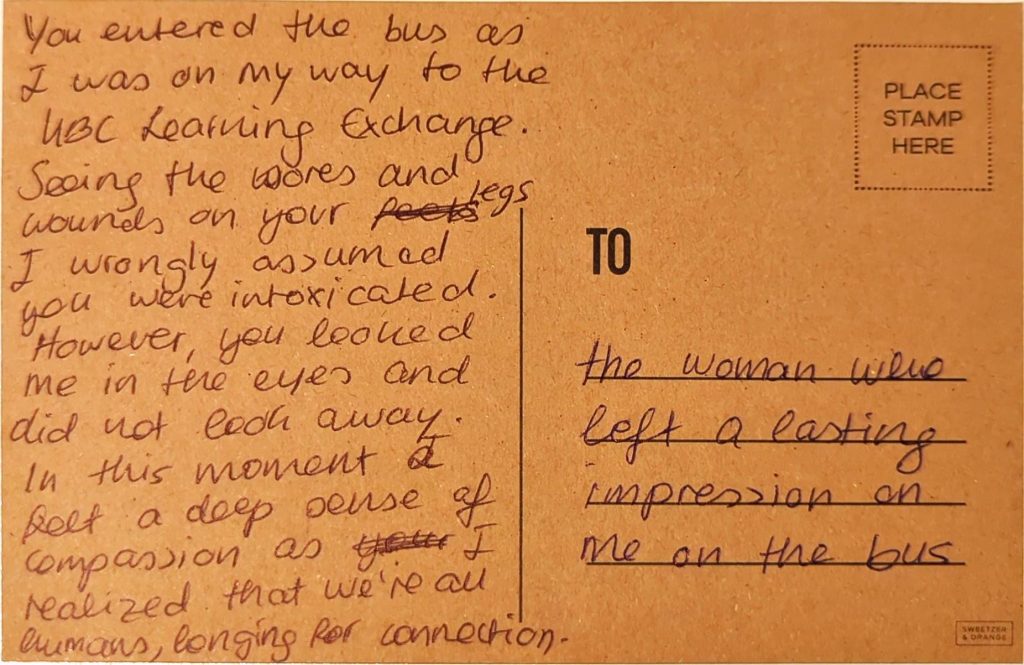
The back of the same postcard with message that reads: “You entered the bus as I was on my way to the UBC Learning Exchange. Seeing the sores and wounds on your legs, I wrongly assumed you were intoxicated. However, you looked me in the eyes and did not look away. In this moment, I felt a deep sense of compassion as I realized that we’re all humans, longing for connection. TO: the woman who left a lasting impression on me on the bus.”
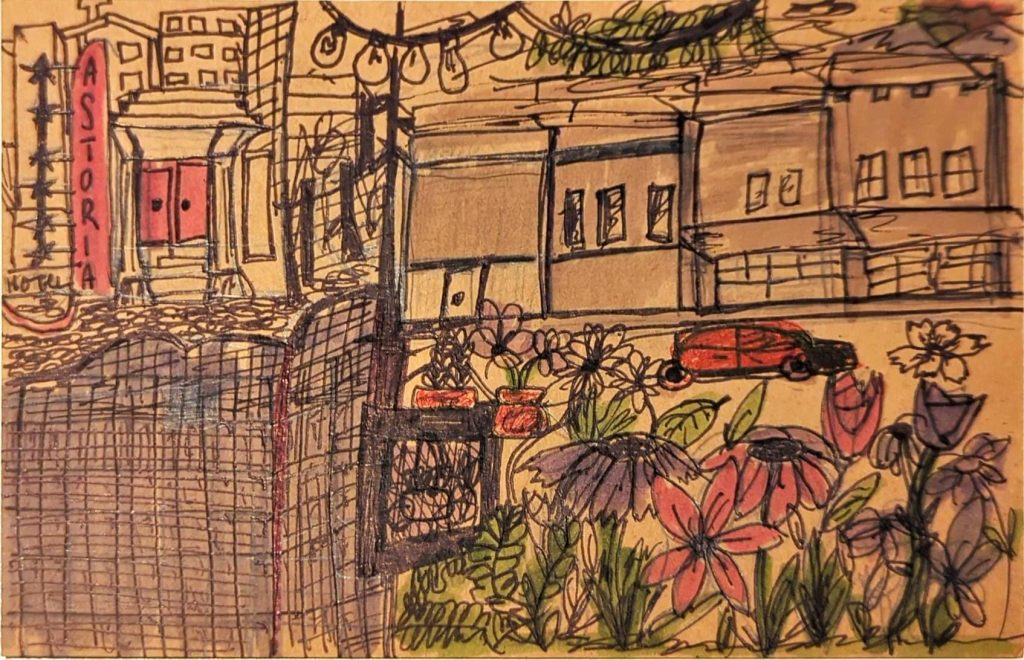
A hand-drawn sketch depicting a street scene, the front of a postcard by Danielle Cosco
![The back of a brown postcard with a handwritten message on the left side. The text reads:"Dear Grandma Rose, I really hope you are doing well up there. I'm writing this postcard to you because I was reminded of you during our last neighborhood walk with the UBC Learning Exchange. We found this small rose garden that is located right before the trains meet the ocean. The sign said 'East Van Rose Garden.' I wonder what the city looked like when you would walk around these streets, and what it felt like to do so. Thinking of you, take care up there. Love, [signature obscured]." On the right side, there is an address field with "TO" and the recipient's address: "Grandma Rose 111 Heaven Avenue Somewhere" with a heart symbol.](http://blogs.ubc.ca/multimodalethnography/files/2024/06/grandma-rose-back-1024x652.jpeg)
The back of the same postcard. The message reads:
“Dear Grandma Rose,
I really hope you are doing well up there. I’m writing this postcard to you because I was reminded of you during our last neighborhood walk with the UBC Learning Exchange. We found this small rose garden that is located right before the trains meet the ocean. The sign said ‘East Van Rose Garden.’ I wonder what the city looked like when you would walk around these streets, and what it felt like to do so. Thinking of you, take care up there.
Love, [signature obscured].”

A hand-drawn sketch by a student researcher/ethnographer ondepicting various bugs.
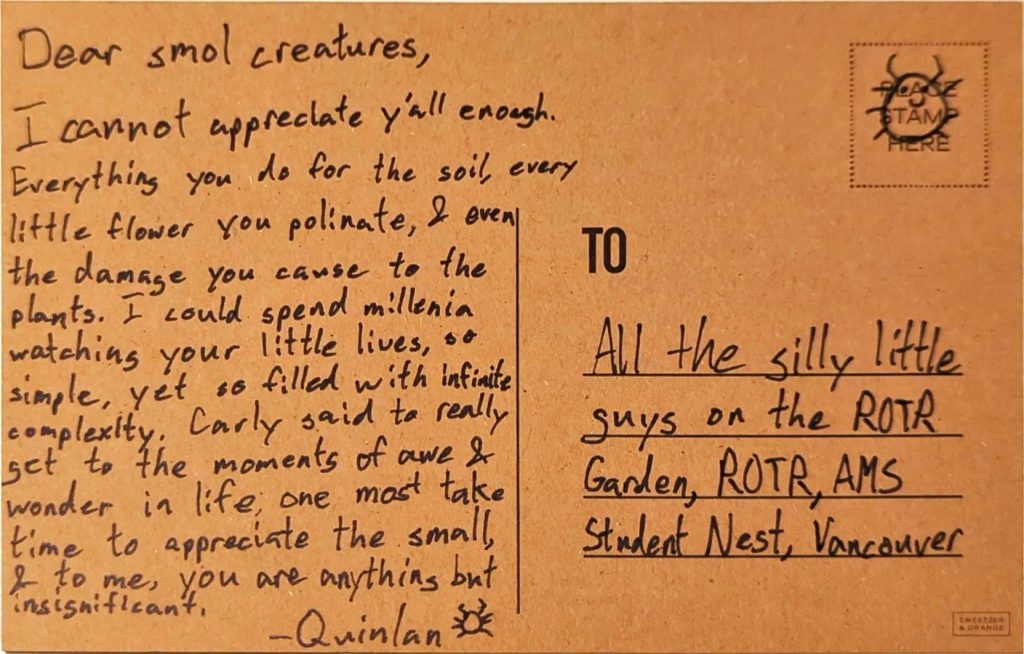
The back of the same postcard with a message that reads: “Dear smol creatures, I cannot appreciate y’all enough. Everything you do for the soil, every little flower you pollinate, & even the damage you cause to the plants. I could spend millennia watching your little lives, so simple, yet so filled with infinite complexity. Carly said to really get to the moments of awe & wonder in life, one must take time to appreciate the small, & to me, you are anything but insignificant. Quinlan.”